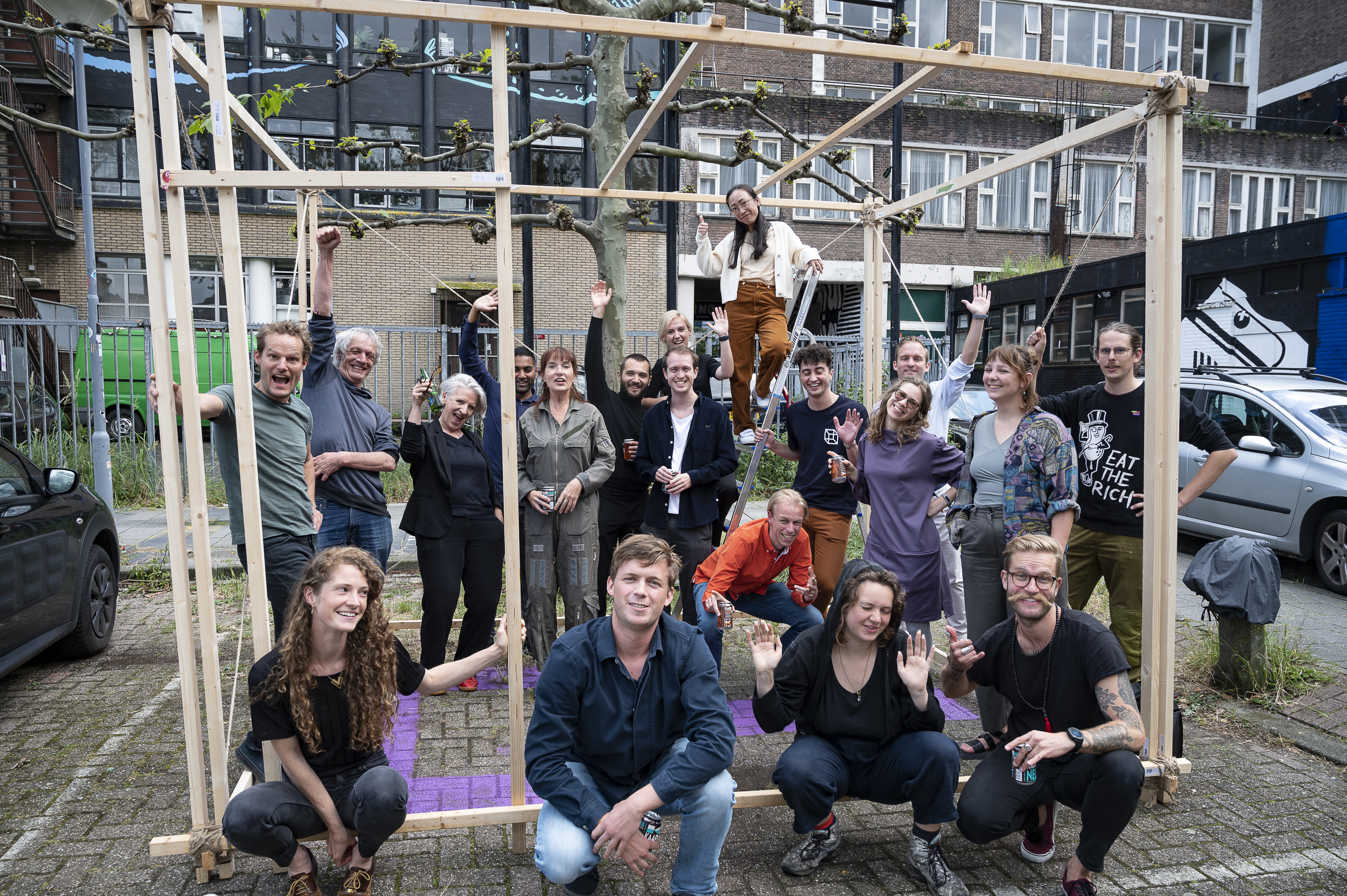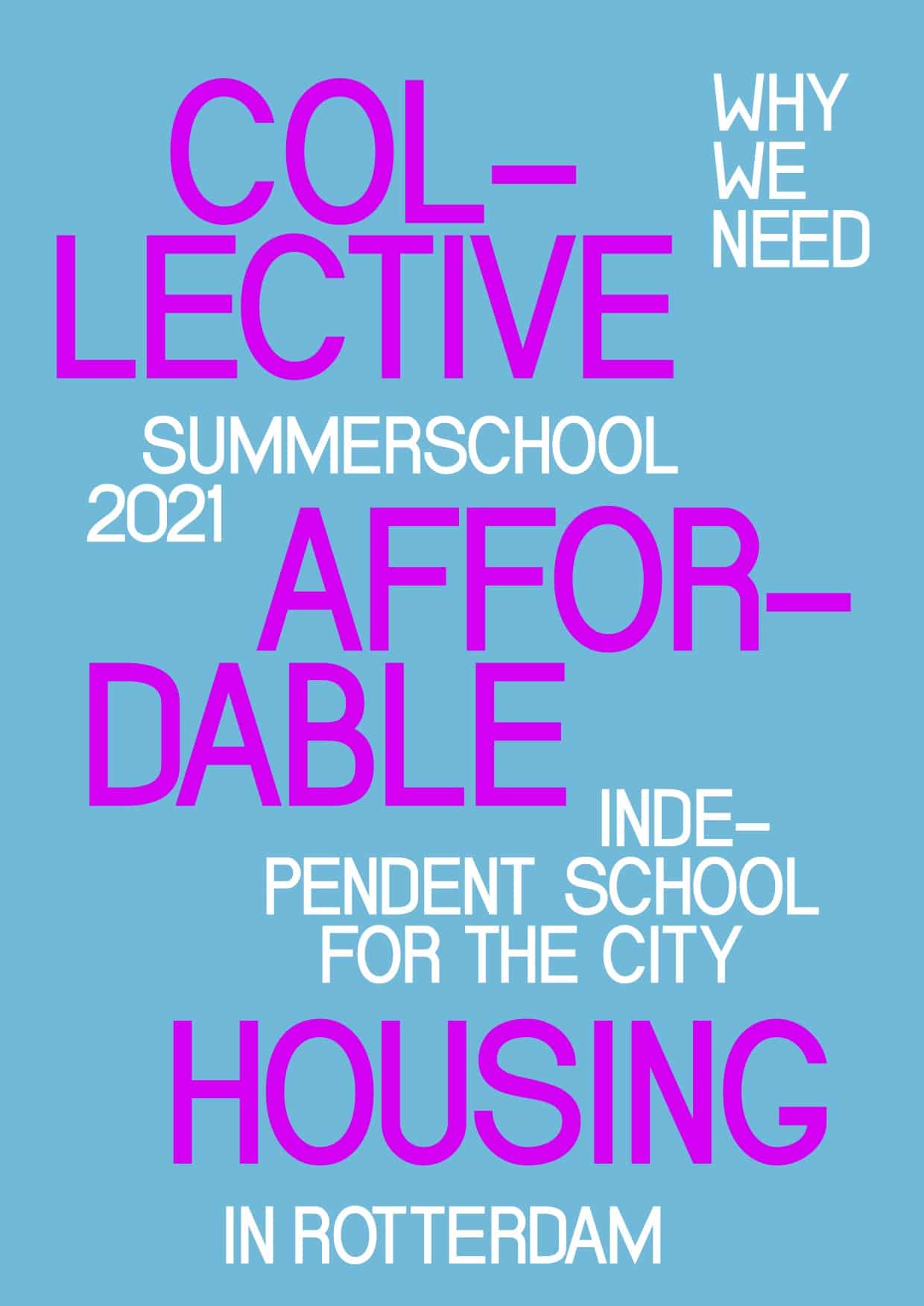Summer School Let's Be R€al!
A two-week summer school exploring new strategies for collective affordable housing with architect Alfredo Brillembourg of Urban-Think Tank Design Partners, experience designer Tessa Steenkamp and Crimson Historians & Urbanists, that took place from 19 - 30 July 2021 in Rotterdam.

During the summer school LET’S BE R€AL! we will explored alternatives for creating actionable living spaces for affordable rents. We did so by means of a collective effort, and with a special focus on existing, vacant property. The Rotterdam collective City in the making (Stad in de Maak) functioned as our external client for the studio. Together we supported them in finding a new location for housing, new models of ownership and new methods of collective city making – using the requirements for their initiative as a real-life case study.
While city centres all over the world are increasingly popular for living, working and tourism, housing has become scarce and real estate prices have skyrocketed. In Rotterdam, like in many other cities, it has become extremely difficult to find an affordable place to live. Although coming from a long tradition of rent controlled social housing in the Netherlands, the neo-liberal policy of recent years has left housing corporations paralyzed and has curtailed their possibilities to invest. This has led to a structural shortage of affordable housing, especially in city centres.
People who are seeking to build a life in the city and who are looking for long term housing solutions, are often forced to rent or buy for top marked prices, which is only within reach for the lucky few. Others find their houses on the city’s fringes or in neighbouring towns. These processes of so-called gentrification and segregation are often described as a law of nature, but in reality, they are the result of deliberate policy-changes that turned the act of buying a home into an investment opportunity. At the same time, the differences between insiders and outsiders (often the younger generation) on both the private housing market as well as in the social housing system, is growing. Rapidly increasing prices have made it more and more difficult for first-time buyers to find a house, while the waiting list for social housing is getting longer every year. Most extremely this becomes clear by the number of young people that became homeless for economic reasons, which has tripled between 2009 and 2019.
Meanwhile, buildings owned by investors or public entities are sometimes kept vacant awaiting their value to increase. While the Netherlands used to have a rich culture of squatting as a means to fight value speculation and taking back vacant space for housing, the act of squatting has become illegal as of 2010. An array of ‘anti-squatting’ companies now rent these empty buildings to small groups of users, to prevent potential squatting. This does not only lead to a very inefficient use of the available space in times of scarcity, but is also the opposite of what creates a vibrant city; anti-squat renters are not invited to invest in a building or their neighbourhood, their rental agreements can be ended anytime, and they are often not allowed to organise social activities in the building.
This Summer School aimed to set an example for major cities worldwide and to propose an array of solutions from different perspectives. The focus was not on the aesthetics of a building, but was aimed at the development of new strategies and organisation models for housing. We have done so by means of a collective effort, and with a special focus on existing, vacant property. The Rotterdam collective City in the making (Stad in de Maak) functioned as our external client for the Summer School. Together we supported them in finding a new location for housing, new models of ownership and new methods of collective city making – using the requirements for their initiative as a real-life case study. Combining organisational, legal and social perspectives with design interven- tions we aimed to come up with a pragmatic method to create more affordable housing for a former elementary school in the Rotterdam neighbourhood of Spangen.
Based on the mission statement of City in the Making, we aim to design a social alternative for the current anti-squat companies that have evolved over time as the predominant (for 90% of owners, the municipality included: the only) model for the management of temporary vacant property in the Netherlands. These companies have quickly come to the forefront of money grabbing entrepreneurship after the anti-squat laws (Wet Kraken en Leegstand) were activated in 2010, which by accident and/or purpose coincided with the financial crisis. The anti-squat business model is in fact a ‘protection mechanism’ against squatting, and as such actually a surveillance system. The people living in these buildings on super tight temporary tenancy, are not seen as tenants with the usual tenant protection, but guards (against squatting) that do not earn any income but have to pay for the privilege of living/guarding.
Many of these property cowboys have become rich overnight. That in itself is not a problem, but as a system it has become one of the motors behind our current precarious housing situation and it prevents value space from being used in its full potential. We therefore believe it should quickly be replaced by a more inclusive and social model, that functions better and creates a certain dignity and self-management power for the temporary tenants. That’s why in this Summerschool we tried to develop a business model that uses the language of entrepreneurs and decision makers (they have to be convinced of the financial, legal and political feasibility), while at the same time it had to be a feasible ‘alternative’ in which we show that vacant management can be done better: more social, more inclusive, more problem solving oriented, more fun!

The Summer School resulted in a booklet as a next step in taking back housing. It includes a conclusion of our research in the form of a manifesto on the need to use vacant space for collective, affordable housing, and gives an overview of different models that were used, altered, and mixed to eventually create various alternative strategies for housing. The booklet can be downloaded by clicking on the image above
Tutors
Alfredo Brillembourg
Alfredo Brillembourg was born in New York, where he studied architecture at Columbia University. He undertook his master’s degree at the Central University of Venezuela after which he co-founded the Urban Think Tank - an interdisciplinary design practice dedicated to high-level research and design on a variety of subjects concerned with contemporary architecture and urbanism in complex environments. Notable projects include the Caracas Metrocable, the Vertical Gym typology, and more recently the documentary and publication on Torre David – a 45-storey unfinished office tower in Caracas that has become a node for the study of informal vertical communities. Brillembourg has taught at Columbia University, where he co-founded the Sustainable Living Urban Model Laboratory (S.L.U.M. Lab), and held the chair for Architecture and Urban Design at ETH Zurich.
Michelle Provoost
Michelle Provoost is part of the Dean Team of the Independent School for the City, co-founder of Crimson Historians and Urbanist, and director of the International New Town Institute. As an architectural historian she is specialised in urban planning history, postwar architecture and contemporary urban development. Michelle has taught at various universities in the Netherlands and abroad and continues to be in great demand as a public speaker. She lectures regularly throughout Europe, Asia, Africa and the United States, and has been involved in many municipal, national and private committees and juries.
Wouter Vanstiphout
Wouter Vanstiphout is an architectural historian and researcher who has written extensively on urbanism and spatial politics. He is part of the Dean Team of Independent School for the City and co-founder of Crimson Historians & Urbanists. From 2008 to 2020 he held the Design & Politics chair at the Technical University in Delft, with which he explored, researched and defined the boundaries, commonalities and tensions between the fields of politics and design. As a practitioner he has directed the renewal of the Dutch industrial satellite town of Rotterdam: Hoogvliet and advises municipalities, the national government, housing corporations and project developers on matters relating to urban renewal, cultural heritage and spatial and urban politics. From 2012 to 2016, he was a member of the national advisory council on the environment and infrastructure (RLI).
Mike Emmerik
Mike Emmerik is School Coordinator of the Independent School for the City and partner at Crimson Historians & Urbanists. He was trained as an urban designer at the Delft University of Technology and subsequently worked in the Faculty of Architecture as a teacher and researcher within the Chair of Design as Politics. Mike took part in various research and design projects at the intersection of urban development and policymaking and is affiliated with the Dutch Board of Government advisors from which he advises the national government and local authorities about issues related to urbanisation and mobility.
Tessa Steenkamp
Tessa Steenkamp is an urban interaction designer, designing interactions within cities rather than with screens. She trained as an industrial designer in Eindhoven’s University of Technology, and later specialised in Emergent Technologies and Design at the AA School of Architecture in London. With her design practice ‘Bits of Space’, Tessa gives shape to the relations and interactions between people, technology and the built environment. Previously, she was experience designer at UNSense – tech startup of architecture firm UNStudio, and at the city of Amsterdam, where she set up ‘OpenStad’: a government innovation programme developing new, digital tools for collective decision making, giving residents more insight in and power over their direct living environments.
About City in the Making
City in the Making (Stad in de Maak) is a common and commoned association set up in 2013 to take on the redevelopment of vacant properties in Rotterdam. The start of this initiative has been triggered by three conditions: the dramatic vacancy that has occurred among the Rotterdam based housing corporations following the start of the 2008 financial crisis, the diminishing of the subsidised housing stock, and finally the desire to reintroduce a place for urban production and economy in neighbourhoods. They find inspiration in the spirit of the historic housing cooperatives, but equally, draw on the recent emergence of open-source maker communities and local circular (micro-)economies. The next step for City in the Making is eventually to go beyond the temporary exploitation of the vacant properties, using principles such as: no speculation with living and working spaces, low-threshold affordability, living space as part of a wider “infrastructure”, partial independence from large economical systems, collective ways of organising with enough freedom for individual needs. And finally, they aim at communities that not only collectively manage building(s), but equally generate their income in these buildings and among their inhabitants. more info here